Growers spoilt for choice with new oilseed rape varieties
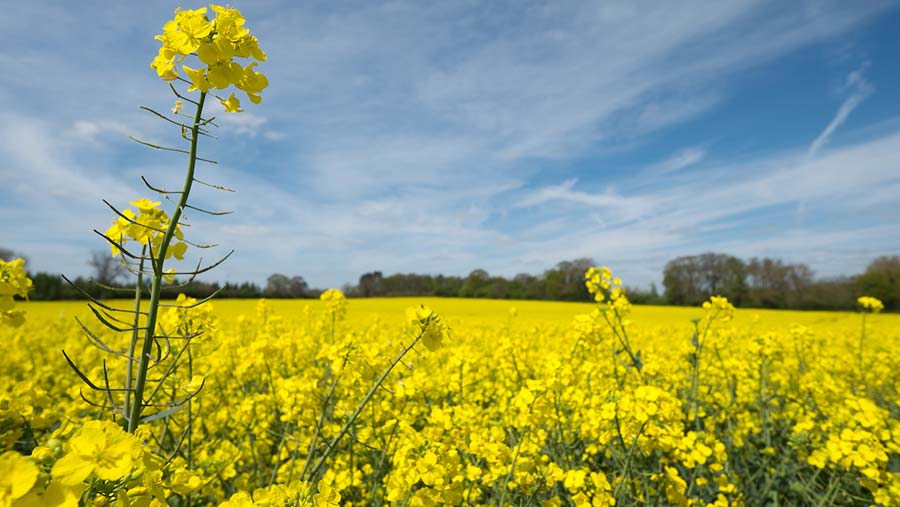 © Tim Scrivener
© Tim Scrivener Conventional oilseed rape varieties may continue to set the pace for gross output, but there is plenty of interest in hybrids and specialist types, especially the Clearfield varieties, according to the seed trade.
As a result, growers looking for ways to overcome establishment issues and other agronomic challenges have a breadth of genetic material to consider, as well as several newcomers to compare with their current choices.
In terms of gross output, the top performers on both the east/west and the north region Recommended Lists – Elgar and Anastasia – are conventional varieties, as are two of the new recommendations, Flamingo and Nikita.
See also: How variety choice can help ease the oilseed rape harvest
Excitement with conventionals
“Conventionals seem to be where the excitement is,” confirms Simon Kightley, oilseeds expert with crop consultant Niab Tag.
Conventional oilseed rape varieties
- Firm favourites: Elgar, Nikita and Campus
- Rising stars: Django and Flamingo
“They are delivering the goods in a very competitive, crowded oilseed rape market, and look set to continue to do that.”
That’s because Django, a short and stiff candidate variety, is leading the pack of hopefuls with a gross output of 110% of control, while two other conventionals, Broadway and Kielder, are giving the best results in the North at this early stage, with 114%.
But the hybrids are also selling well and dominate in certain regions and situations, reveal merchants and breeders, especially where rapid establishment and early vigour are required to get the crop out of the ground quickly and growing away from pest attack.
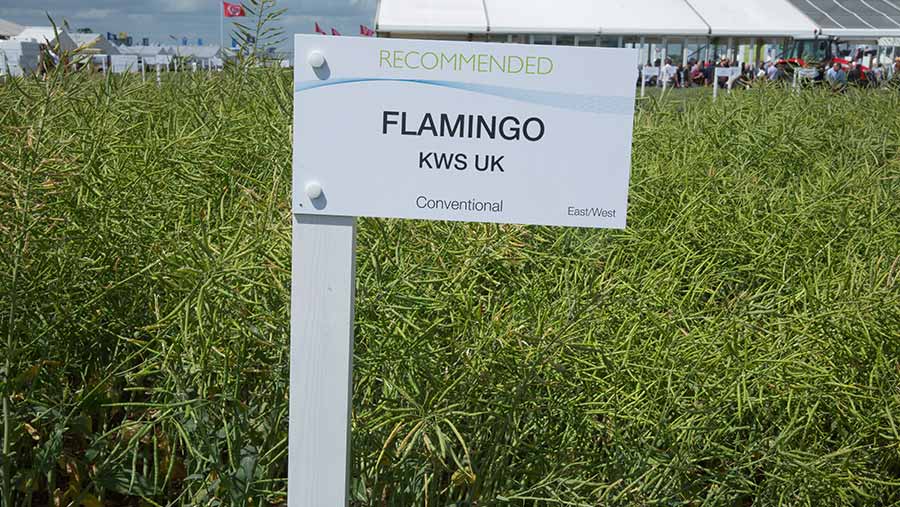
© Tim Scrivener
Later drilling hybrids
Hybrid varieties are finding a place in the slightly later September drilling slot, when they can take advantage of seed-bed moisture and any reduction in flea beetle activity.
Hybrid oilseed rape varieties
- Firm favourites: Alizze, DK Extrovert and Incentive
- Rising stars: Aquila and the Clearfield varieties
“If you are planting a bit later and you want to find out about the early vigour of a variety, you are dependent on the breeder for that information and you should ask them outright,” says Mike Mann of DSV.
DSV’s Incentive has been the top-selling hybrid on the Recommended List for the past two years, but the company also has high hopes for its UK candidate hybrid Sparrow, which takes gross output on by 3-4% and offers improved disease resistance.
“It’s from the same genetic background as Incentive, so it brings the reliability and consistency that growers value, as well as the standing power they expect. Like all DSV varieties, it shows strong pod shatter resistance.”
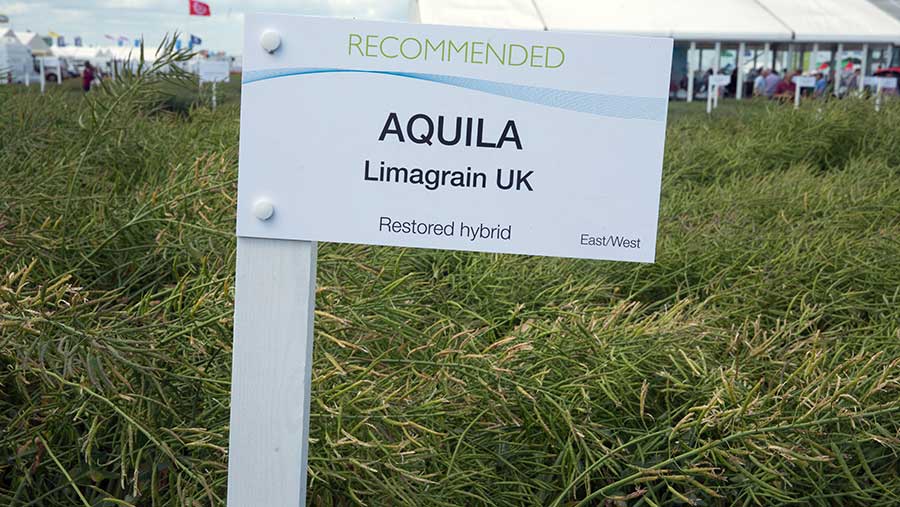
© Tim Scrivener
New choice
Newly recommended hybrid Aquila from Limagrain is favoured by Russell Frost of Cofco, who points out that it has early flowering, better disease resistance than other hybrids and good lodging scores.
It joins good company, with existing hybrid choices Alizze, Windozz and Wembley all expected to feature in cropping plans.
“Aquila will sell well, as will the candidate Django,” he predicts. “They will join Elgar, Extrovert and Incentive as popular choices.”
Virus resistance
Progress with turnip yellows virus resistance sees Limagrain’s candidates Annalise and Architect show an 8% improvement over Amalie, the first of this type.
Architect is the only hybrid to have this trait, while Annalise is a conventional variety. Both are stiff, with medium to late flowering and medium maturity, as well as a rating of 6 for light leaf spot and stem canker.
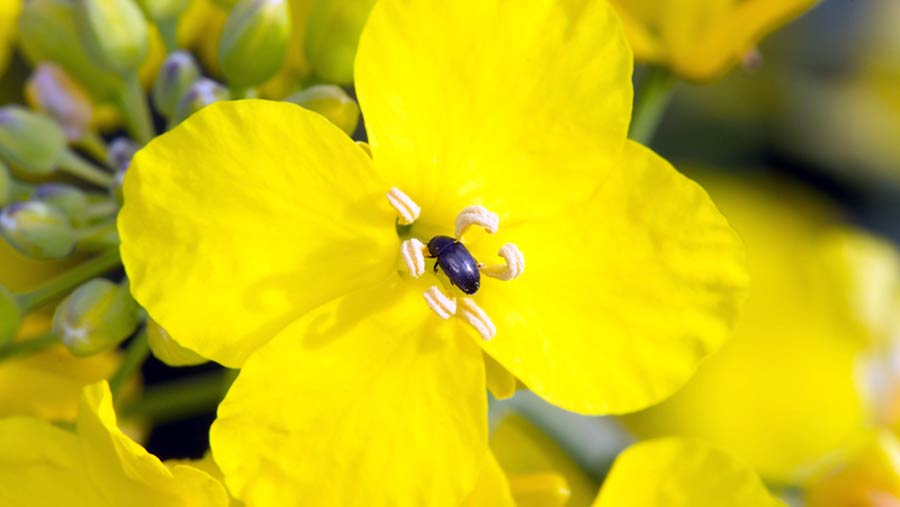
© Tim Scrivener
“The only difficulty with these varieties is knowing where to grow them, as you can’t predict virus pressure,” says Mr Kightley.
“It’s good to see such a jump in yield, but most growers will have three or four varieties in the mix, rather than just virus-resistant types.”
What about the oil bonus?
Varieties with an oil content above 40% will earn growers a premium of 1.5% for every 1% of extra oil.
With the new crop price at about £300/t, that can add another £23-£26/t, depending on the final oil figure.
All of the recommended varieties have oil contents above 40%, ranging from 44.4-46.4%, so will be eligible for the oil bonus.
As a guide, their gross output figure is calculated from the seed yield, with an adjustment made to take account of oil content.
The exception to this are the high-oleic, low-linoleic (Holl) and high-erucic acid rape (Hear) varieties, as they produce oils with a different profile for guaranteed markets that are prepared to pay a premium in addition to the oil bonus.
The premium for Hear varieties is £35/t, while for Holl types it stands at £25/t.
Both Holl and Hear varieties must be grown on contract and according to guidelines, which includes keeping them separate from others, to ensure quality of supply and traceability.
Clearfield varieties
There’s increased interest in the Clearfield types, report breeders and retailers, as growers look for ways to deal with tricky establishment issues and spread their risk.
With 11 Clearfield varieties on the market ahead of this autumn, giving more choice than ever, they can all be identified by the CL suffix to their name.
All Clearfield varieties have tolerance to specific imidazolinone herbicides, so have to be used in conjunction with the BASF herbicides Cleranda (imazamox and metazachlor) and Cleravo (imazamox and quinmerac).
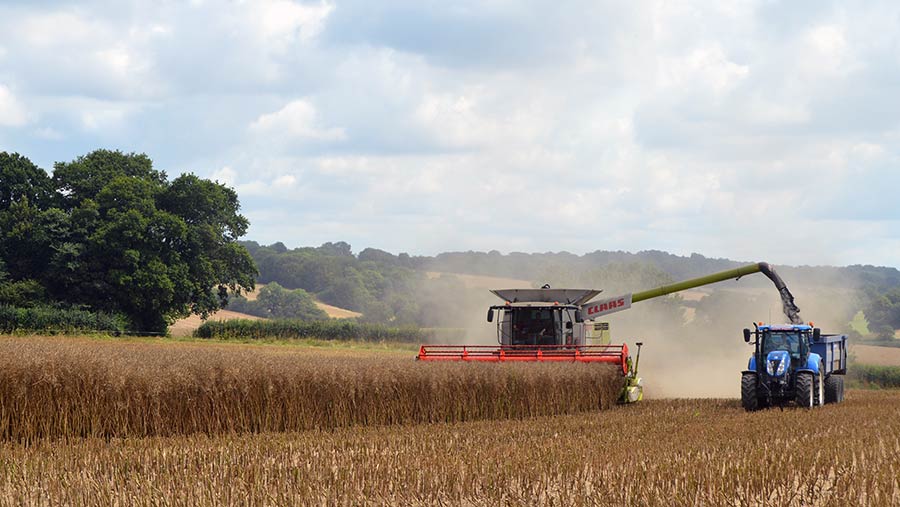
© Oli Hill/RBI
While they won’t be found on the Recommended List, some are getting very close to the standard on yield, with the leading varieties less than 5% behind the market leaders.
They have also allowed growers to stop desiccating, as clean fields mean crops can senesce naturally, gaining seed and oil content, says Mr Mann.
See also: Herbicide-tolerant crops have growing role in weed control
DSV has a new Clearfield variety, Phoenix CL, for this autumn which it claims offers yields at the Incentive level.
Other breeders with Clearfield varieties include Pioneer, Grainseed and Dekalb – with the latter’s varieties, DK Imperial CL and DK Impression CL, performing best in independent Niab Tag trials across four sites.
Case study: Andrew Robinson, Heathcote Farms, Bedfordshire
Hybrid varieties have accounted for all of the oilseed rape grown for the past few years at Heathcote Farms, Bedfordshire, with farm manager Andrew Robinson opting for those that demonstrate the most vigour in the autumn.
The constant flea beetle threat at that time of year means every bit of early vigour helps grow about 300ha of rapeseed, as rapid establishment is required to give the crop the best chance of surviving the pest onslaught.
Mr Robinson has seen differences between varieties when it comes to autumn vigour, so uses independent sources and breeders to identify which ones have an advantage.
“Conventional varieties can have good vigour too, but we are also looking for other characteristics, such as good phoma resistance, as we have quite a close rotation. Hybrids have proved to be the best package for our situation.”
In the ground this year, Mr Robinson has Alizze and DK Extrovert, as well as one field of DK Imperial CL, to assess the benefits of the Clearfield system.
“Alizze has done well for us for the past two years – it’s a vigorous variety with good agronomics. And the Dekalb varieties have the other traits that we are looking for, as well as consistency.”
Line-up changes
Next year, Mr Robinson is changing his line-up and will be increasing the amount of Clearfield oilseed rape, so is planning to have at least half of his area in DK Impressario CL.
His reasons for doing so include the presence of cruciferous weeds, especially hedge mustard, and establishment issues following heavy sulfonylurea herbicide use in the past.
“It also means the crop can get away unchecked, as there is no need to apply pre-emergence herbicides. That should help if flea beetles are around again.”
“Volunteers are dealt with as well. Once the herbicide is applied, it wipes them out.”
The average rapeseed yield at Heathcote Farms is 4.6t/ha, although Mr Robinson is hoping to exceed that this year and is pleased with the way crops have grown.

